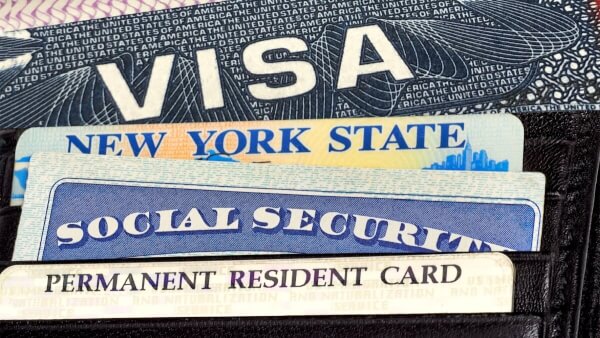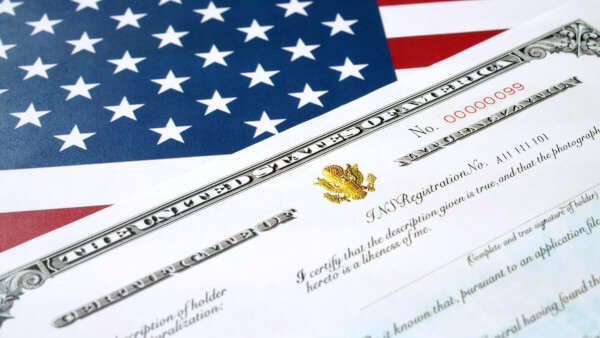Transferring your international driver's license to the US: step-by-step
Your full guide to updating your foreign driver's license to the US.

Interviews - they’re about as popular as public speaking and the dentist. But with a little preparation, your chances of acing them are much higher.
In the process of getting a green card, one of the last steps is the green card interview. This is done to make sure the information you provided in your application is true.
If you’re in the process of getting your green card, then read along as we cover the green card interview in depth. At the end of the article, you’ll also read about Wise and how it can help you to save money when paying for your green card.
| 📝 Table of Contents |
|---|
The purpose of the green card -also known as the Adjustment of Status (AOS)- interview is to confirm that what you included in your application is true.
It also gives you the chance to amend any parts of your application that have changed since you filed it, for example, a new employer or different address. ¹
The end goal of the AOS interview and the interview questions, are to confirm that you are eligible for a green card.
| 📚 Who you’re interviewed by depends on where you’re applying from. |
|---|
| Learn more - The green card explained |
|---|
The green card interview is the last step in the green card application process. When it happens depends on your situation, but the USCIS will send you the date, location and time of your interview. ²
Generally speaking, almost everyone will have to do a green card interview.
But there are some instances in which the USCIS will waive an interview, such as if you’re obviously ineligible for a green card or if you’re the parent of a US citizen.
Basically, if the USCIS thinks an interview is unnecessary, they can waive it. But equally, they can still choose to interview you even if you’re eligible for a waiver. ³

As the saying goes: Fail to prepare, prepare to fail!
And the green card interview is no different. But as long as you understand what questions you’ll be asked and what documents to bring along, you’ll be well on your way to success.
The documents you need to bring to the interview are almost the same no matter your circumstances. But there is a small difference between those applying from outside the US versus those applying from within.
Additionally, if any of your circumstances have changed since you filed your application then you need to bring the new supporting evidence of that change with you.
If you’re applying from outside the US, you’ll go through the process of “Consular Processing”. Simply, your application is processed through the US embassy or consulate in your country.
| For Consular Processing applicants, you’ll need to bring: |
|---|
If you’re applying from within the US, you’ll go through the process of “Adjustment of Status”. Basically, this just means that you’re adjusting your current visa.
| For Adjustment of Status applicants, you’ll need to bring: |
|---|
| |
If you’re not fluent in English, then you’re eligible to bring an interpreter with you. The interpreter must:
You can also bring a lawyer if you have prior legal or immigration related issues on your record. ⁶
In general, questions are about residential, family, work, education, immigration and criminal history.
On top of that, if you’re applying through a specific eligibility criteria such as marriage, then there’ll be further questions about that criteria.

You’ll likely be asked some general questions about the personal information you provided as well as security questions. These are normally something along the lines of:
More specific questions will be about the category through which you’ve claimed green card eligibility.
There are lots of different situations in which you’re eligible for a green card. Here are a few:
| 📚 The USCIS may ask you slightly different questions depending through which category you’ve applied for your green card. |
|---|
Here are some examples of marriage-based green card interview questions:
Similarly, for an employment-based green card, the interviewing officer will ask questions along the lines of:
So, on top of making sure the information you provided is accurate, the interviewing officer will also be checking that the eligibility criteria you’re using is suitable.
Diamonds are made under pressure, right? But seriously, although the interview can seem daunting, as long as you’re prepared and honest, then you have nothing to worry about.
Here are some tips that will help you ace the interview:
Great job! You’ve done all the hard stuff. Now all you have to do is put your feet up and wait.
After your interview, you’ll receive the result and, if your application was successful, then you’ll get your green card in the mail.
After the interview, there are five possible outcomes.
The official USCIS website lists only approval, denial and Request for Evidence (RFE) as the outcomes, but other advice articles also include additional review and second interview as possibilities. ⁹
| Wise can save you money when you pay the fees for your green card by offering you the mid-market exchange rate. No hidden fees, no markup! |
|---|
Overall, the green card interview is the same as any interview.
You need to be prepared and should always be honest with your answers. But you don’t need to stress over it any more than normal.
As long as you follow this advice, you should be well on your way to get your green card.
Your green card is in your pocket and you're ready to move. But wait!
There's something else you should consider. Remember that you have to move your savings from the country you live in at the moment to the US.
Opening a bank account could take a long time and you'll need your money as fast as possible to start your life in the Land of Opportunities. Open a multi-currency account with Wise and save up to 7x more compared to standard financial institutions.
Open a USD account in seconds ⌚
Sources:All sources checked on 7 May 2021
*Please see terms of use and product availability for your region or visit Wise fees and pricing for the most up to date pricing and fee information.
This publication is provided for general information purposes and does not constitute legal, tax or other professional advice from Wise Payments Limited or its subsidiaries and its affiliates, and it is not intended as a substitute for obtaining advice from a financial advisor or any other professional.
We make no representations, warranties or guarantees, whether expressed or implied, that the content in the publication is accurate, complete or up to date.

Your full guide to updating your foreign driver's license to the US.

Whatever your reason is for moving to the US, this guide aims to help you figure out the most important costs you'll face when you live there.

Find all you need to know about getting a personal loan for H-1B visa holders in this guide.

Everything you need to know about the US certificate of naturalization.

The US welcomes large numbers of new arrivals every year — and getting a great job to both gain experience and set down roots is a core part of the American...

Find everything you need to know about the US citizenship test, including the USCIS questions and answers.